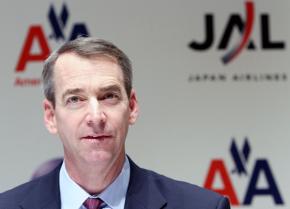Bankruptcy as a weapon
reports on the scale of American Airlines' attack on its unions.
AMERICAN AIRLINES workers knew they were in trouble when the company declared bankruptcy in November. Now they're learning that the trouble is far worse than they ever dreamed possible.
American announced at the beginning of the month that it wants to cut 13,000 jobs--in order to "return to profitability." This includes 4,200 fleet service workers who are members of the Transport Workers Union (TWU), 4,600 mechanics, 2,300 flight attendants and 400 pilots. American also wants to cut health benefits and terminate its pension plans.
If the company gets its way, flight attendants, for example, would suffer an 18 percent pay cut and have to work longer hours--those who weren't laid off, that is.
Union leaders were shocked by the airline's plan. Linda Glading, president of the Association of Professional Flight Attendants told the New York Times, "They have taken every provision of our contract and simply ripped them out. It's outrageous. This isn't something we will agree to, and we will fight it."

TWU President James Little told KERA Radio: "I was surprised at the depth of the cuts...The trouble I have sleeping is all the families we represent and all the American employees impacted by us. It also affects the community as well."
Like Gladding of the flight attendants union, Little promised to fight the cuts in bankruptcy court, where Judge Sean H. Lane will make the final decision. He said the TWU has hired investment bankers, economists and other experts to help it present its case.
But the unions will find it very difficult to win anything very significant in bankruptcy court. First of all, in a corporate bankruptcy, the law makes it very clear that the process is about meeting the needs of the corporation's creditors. Union contracts and the needs of workers don't really matter.
There's no reason to expect Lane to be sympathetic to unions or workers. Before he became a judge, he was a partner in one of the top corporate law firms in the country, Baker Hostetler, whose clients include ExxonMobil, IBM, Morgan Stanley and ABC. Later, he was a leading federal prosecutor--an assistant U. S. Attorney for the Southern District of New York, where the American Airlines case is being heard.
IF AMERICAN succeeds in dumping its pension plans onto the Pension Benefit Guaranty Corp. (PBGC), the federal agency that tries to protect workers' pensions, 13,000 workers could have their pensions cut.
When the PBGC takes over a private pension plan, payments are capped at $54,000 a year. In previous cases involving airlines, more than 20 percent of workers had their pensions reduced when the PBGC took over their plans. The day it filed for bankruptcy, American notified workers that future retirees could no longer get a lump-sum distribution because the pension plan is underfunded.
Jioni Palmer of the PBGC told KERA Radio:
It's disturbing that American Airlines is sitting on a pile of cash $4 billion high, and yet they have failed to make their January 15 pension payment. Our goal here is we want American reorganized in a way that doesn't hurt the retirement security of its workers and retirees. But the company doesn't even bother to pretend it's trying to preserve its pension plan. And that's very, very unfortunate.
The PBGC itself could be in danger if it's forced to take over the American Airlines pensions. It already faces a $23 billion deficit because companies don't want to fully fund it. The American pensions would add another $9 billion to the red ink.
Ultimately, the PBGC is likely to have to seek a federal bailout. This would mean that working people, who already pay more than their share of taxes, would pick up the bill for corporations that won't pay for workers' pensions.
American Airlines unions may find it very difficult to save their members' jobs, wages and pensions. They will need to exhaust all legal remedies and use all their political power. But sooner or later, they may have to turn to industrial action, such as a work to rule, sickout or even a strike.


